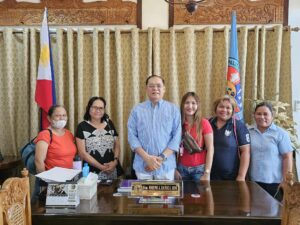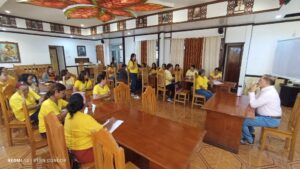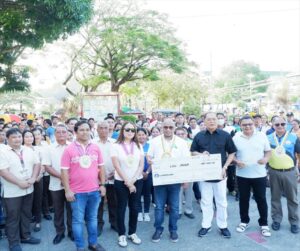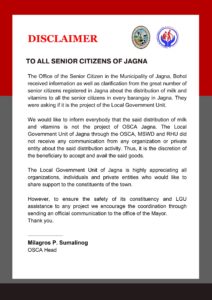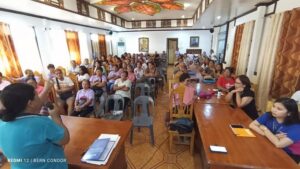The advent of distance education or distance learning, a modern concept of education delivery, has allowed students who cannot be physically present in schools for some reason to earn a degree by just logging on to the internet and communicate with an online teacher.
The concept of distance education started a long time ago. This gave rise to the now popularly termed “virtual university”. Now in the Philippines, course offerings are conducted online thru the computer.
An internet connection plays a vital role in the proper conduct and delivery of distance education.
The parish of St. Joseph the Worker in Lonoy is giving an opportunity to poor and committed students to acquire a degree thru distance education thru the newly opened e-Learning Center. Scholars will all come from within the 8 barangay-jurisdiction of the parish. Housed in the parish pastoral center are computers programmed for the purpose of distance education. Tertiary education scholarships are offered to young members of the parish. These young students are screened for their interest and most of all their commitment to finish college. The parents also participate in the screening to gauge their support and commitment for their children’s endeavor.
This e-learning in the barangays is a brainchild of the Visayas Mission Confraternity, Inc. (VMCI) thru their “Raise a Village Project”. This project conceptualized by Rev. Fr. Bienvenido (Ned) Dizu, CM, the Director of VMCI, aims to educate at least a hundred young students in the barangays. Fr. Dizu believes that thru earning a good education living conditions will be uplifted.
The concept of “pay it forward” is introduced to the scholar wherein a MOA is signed between the scholar and VMCI that the scholar when able to land employment will sponsor 2 other students who are not his relatives. There will be a “multiplier effect” according to Dr. Guillermo Aviles, the chairman of the center.
E-learning was introduced by Dr. Dylan Dizon, a retired professor of the University of Michigan. Dr. Dizon believes that it is thru e-learning that the school will be brought to the students thereby saving on the expense of board and lodging, fares, etc.
In partnership with the Professional Academy of the Philippines (PAP) in Naga, Cebu, poor but committed students are given opportunity to acquire scholarships and earn a degree. The scholarships are provided by the Rotary Club of North Cebu, Rotary Club Cebu West and Rotary Club of Collingwood – SGB, Canada thru VMCI.
During the launch on April 18, 2011, there are 13 scholars availing of the e-learning. Ten are scholars of the Rotary Clubs and 3 are scholars of Mr. Sven Cerlsson, a Swedish national.
Modules are installed in the computer and the courses offered for the first two years are general subjects such as Math I, English I, Thinking Skills and Computer I. Skills development is also combined in coordination with TESDA. This is a ladderized program so that when the students choose not to finish a four-year course they will be equipped with both knowledge and skills that will give them decent jobs. If the students want to proceed to a specialized course they will continue on to the third year and fourth year.
The schedule of classes are for Monday will be Community Service wherein the students are required to report to their respective barangays and help in the community. The students will be monitored by the barangay captains. From Tuesday to Friday, 2 hours is allotted wherein the students will be hands on in the computer and then lessons in the other 3 subjects.
At present, lacking in internet connection, the center is utilizing retired teacher-volunteers to facilitate the classes. The manager of the e-Learning Center Ms. Editha Sarigumba handles Computer I; Mrs. Pacienta C. Tadena is handling English I; consultant Dr. Yolanda T. Aviles is facilitating Thinking Skills I; and the chairman of the center Dr. Guillermo C. Aviles will handle Math I which will start this month.
In an interview with the parish priest of Lonoy, he said that it is the parish that is shouldering the electricity of the center; it is the VMCI who shouldered the other needs such as cables, AVRs for the computers; and the computers all come from Adamson University as a partner in providing post graduate courses in the center starting June this year.
However, the problem with the internet connection hinders the center from accessing its online teachers. Signal in Lonoy is poor. The parish and the management of the center have appealed to one of the communication providers to install a cell site in the area to boost up the internet signal in anticipation of more enrollments to come especially in June when the center will be opening up its post graduate studies.
The center according to St. Joseph the Worker parish priest is appealing to would be donors for computer tables. Current tables are nearly rundown and cannot support the weight of the computers in the long run.


